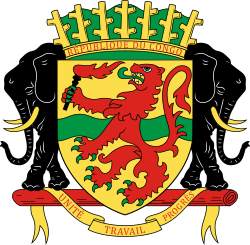 |
|---|
Parliamentary elections were held in the Republic of the Congo on 14 June 1959. The result was a victory for the Democratic Union for the Defense of African Interests, which won 51 of the 61 seats. [1]
 |
|---|
Parliamentary elections were held in the Republic of the Congo on 14 June 1959. The result was a victory for the Democratic Union for the Defense of African Interests, which won 51 of the 61 seats. [1]
| Party | Votes | % | Seats | +/– | |
|---|---|---|---|---|---|
| Democratic Union for the Defense of African Interests | 199,309 | 57.93 | 51 | +34 | |
| African Socialist Movement–Congolese Progressive Party | 144,766 | 42.07 | 10 | –9 | |
| Total | 344,075 | 100.00 | 61 | +16 | |
| Valid votes | 344,075 | 99.48 | |||
| Invalid/blank votes | 1,808 | 0.52 | |||
| Total votes | 345,883 | 100.00 | |||
| Registered voters/turnout | 446,199 | 77.52 | |||
| Source: Sternberger et al. [2] | |||||